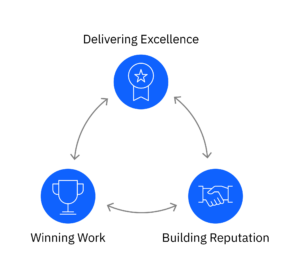
By Mike Polgreen, Sr. Director, Client Relations
For delivery teams working on the client side, how GovCon corporate teams win new work may be somewhat of a mystery. Delivery personnel often assume business development is someone else’s job – the responsibility of some salesman somewhere. While that is true to a point, it is not the whole story. Service delivery excellence is one of the most critical factors affecting new contract awards, recompetes, and more. And it’s something leaders and managers need to remind delivery teams about consistently if we want to continue to succeed in the industry.
Behind the acquisition scene: educating delivery teams
Delivery teams too often do not know the basics of acquisition. It’s not their fault. They may be new to GovCon, they may never have had anyone explain how it works, or they may just be so focused on delivery—which is admirable—they may forget.
The first thing I consistently educate delivery teams on is how extensive background activities contribute to winning new contracts. I explain how these efforts go on for years, how business development teams are constantly building relationships, tracking contracts, and making decisions that can impact the government’s choice of contract vehicles. These efforts culminate when we activate corporate support to plan, fund, and execute a bid submission.
Then we get into the more important aspect of acquisition and where they come in: While demonstrating service delivery excellence may not be a stated requirement during acquisition, it absolutely influences the scoring of each element throughout the process, especially when it comes to more subjective scoring criteria. Positive effects of each delivery team’s performance seep into the fabric of the agency they serve. This happens when delivery teams provide quality service while building trusted relationships with the customer. Doing both helps create a good impression of us, the company as a whole. Each kudo, award of appreciation, or anecdote about us doing something innovative, saving money, or being otherwise awesome helps. The customer’s opinion of delivery influences how they—and we—think about:
- Recompetes
- Upcoming new work
- Past performance
- Relationships
Service excellence happens when we make our client’s challenges our own and amaze them with the results. By delivering on time, saving money, or going above and beyond, we become a trusted advisor and can help turn proposals into awards. Delivery experts need to know this is what they are charged with as they help their customers meet the mission.
Every action matters
A legendary football coach once said that a game’s outcome hinges on just a few key plays during the game. And since we don’t know which plays those are, we should try as hard as we can every play.
The federal contracting corollary to “try hard in every play” illustrates how a single key work item on any given workday could be the action or result that is remembered at proposal evaluation time. It illustrates how we reinforce a virtuous cycle of winning work, delivering excellence, influencing future contracts, followed by more wins. But it can be hard to see from the perspective of delivery teams entrenched by the daily grind.
As leaders, we need to remind delivery teams that government decisionmakers are human. Each official wants to be successful, and if there is a vendor they trust, they want them to submit a bid, one that cannot be protested. That is why on the corporate side, we make sure to include memorable kudos, achievements, and deliverables in our proposal, using those as proof-points to remind the procuring agency about good things that happened. We want to make federal decisionmakers wistful about what makes us special. Like well-crafted puzzle pieces, we carefully fit together proposal content.
Of course, the opposite is also true. If officials and current customers have positive feelings about us, they will want ways to select or keep us, but if the memories or impressions are bad, they want vendors to replace us. Negative performance examples mentioned in CPARS (the government’s Contractor Performance Assessment Reporting System) or bid debriefs from customers without a favorable opinion of us can cause contractors to lose the bid. Anything done poorly and even one negative anecdote will work against us.
Many times, as leaders, we wish the project team could see the result of their daily actions in advance, spurring them to improve delivery quality. Everyone needs to understand that if a customer’s opinion turns negative, it is almost impossible to reverse that opinion.
The same can be said for positive opinion: Even when we encounter federal personnel who are no longer direct customers, they reminisce about deliverables we completed, outstanding accomplishments, or how much we helped them achieve major goals. This can lead to conversations about which contract vehicles we have access to, any capabilities that align with what they are doing now, and acknowledgements that we should bid on something coming out in the future.
Remember—it’s everyone
When it comes to sales, each delivery team member supports business development on a daily basis. What they do matters, even if they can’t see it. The connection between delivery and contract awards is strengthened when:
- A program gets used as positive Past Performance
- A project’s positive CPARS ratings are cited or used
- Something intangible, like an impression, is recalled as positive
The government has a long memory, and so does Octo/IBM. A single notable client opinion of performance can be used dozens of times. We want our customers to think they can’t live without us, which will lead to positive evaluations of our bids. All of us who currently perform delivery, even if indirectly, support sales by demonstrating why customers should choose us when making an award. Leaders, tell your delivery teams they are important. Take the time to educate them and give them reminders often. No one succeeds if delivery teams don’t.


